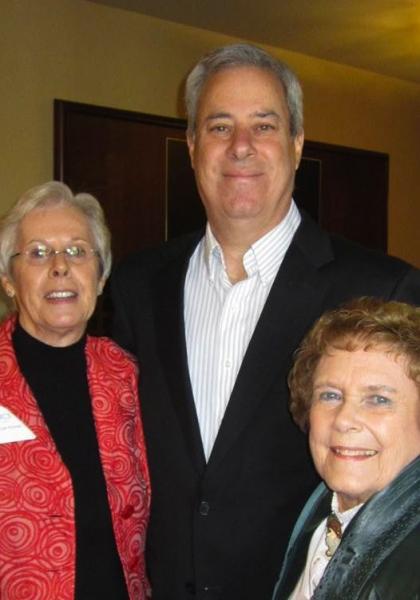ARCS Phoenix members and guests enjoyed the December 2013 Phoenix BOD Meeting and Luncheon featuring guest speaker Eric M. Reiman, MD. Dr. Reiman's topic was “Alzheimer’s Disease – a Distant Memory?”
 Dr. Reiman’s titles are impressive! He is Executive Director of the Banner Alzheimer’s Institute, Chief Executive Officer for Banner Research, Clinical Director of the Neurogenomics Division at TGen, Professor of Psychiatry at the University of Arizona, and Director of the Arizona Alzheimer’s Consortium.
Dr. Reiman’s titles are impressive! He is Executive Director of the Banner Alzheimer’s Institute, Chief Executive Officer for Banner Research, Clinical Director of the Neurogenomics Division at TGen, Professor of Psychiatry at the University of Arizona, and Director of the Arizona Alzheimer’s Consortium.
His research interests include brain imaging, genomics, and their use in the early detection and tracking of Alzheimer’s disease (AD), the evaluation of genetic and non-genetic risk factors, and the accelerated evaluation of treatments to prevent AD. He and his colleagues have used imaging techniques to detect and track the earliest brain changes associated with the genetic risk of AD, and they have suggested how imaging techniques could be used in at-risk people to accelerate the evaluation of promising Alzheimer’s prevention therapies. Under Dr. Reiman’s leadership, researchers and institutional leaders in Arizona established the Arizona Alzheimer’s Consortium, a leading model of statewide collaboration in AD research.
Alzheimers is the most common form of dementia affecting 60% of the people who develop memory problems. This includes about 10% of people over 65 and 50% of people over 85. Researchers have made progress in the last decades by finding clues about genetic risk factors. They now have a growing portfolio of treatments.
Healthy lifestyle interventions may help decrease the accumulation of amyloid plaques but are often started too late. The tangles double in frequency every 5 years of aging, often making it too late for treatment by the time Alzheimers is diagnosed. According to Dr. Reiman, prevention needs to be focused on.
There appears to be a genetic influence that represents about 70% of the risk factors. Researchers need to determine the other 30%. The risk goes up 500%, if two parents rather than one are affected by the disease. Scientists have found biomarkers that might help them to detect the disease earlier. Progressive brain changes occur in people who carry the markers (one copy or more). Currently, anti-amyloid treatment is in 2-year trials. Another study beginning in 2014 following 60-75 year olds, who have 2 copies, may shed more light on prevention and treatment.
A promising study is being done in Columbia, South America where 5,000 living residents are being followed through a 5-year NIH grant. Their community's unfortunate history of Alzheimer's at an early age makes this an ideal source of data. Much is yet to be learned from this study.
Current goals include finding treatments earlier in the pre-clinical stages of the disease and learning more about those already afflicted; i.e. medication strategies, deep brain stiulation; treatment for combination plaque and tangles. Both medical and non-medical aspects need to be targeted.
Another goal is to try to keep patients out of the hospital by understanding risk factors and managing issues. Unfortunately, diagnoses often come too late. Life after diagnosis requires caregivers and a consortium has been formed in Arizona to help caregivers.
Since roughly 70% is genetic, what are the other 30% non-genetic risk factors? Suggested preventions include but are not exclusive to aerobic exercise; mental exercise; lower blood pressure and cholesterol. However, it is still hard to know for sure. There may be a number of issues at play. For example - Do head injuries play a role? - Especially multiple, repetitive; “head-bangers”. Better connection to risk will lead to progress.
In summary, here are some suggestions that came from Dr. Reiman's talk:
In dealing with a patient go with the person’s reality. Distract rather then confront.
Non-medical strategies may help such as aerobic exercise and mental exercise.
Get a good night's rest - loss of sleep heightens risk (i.e. sleep apnea or other).
Deep brain stimulation may improve – careful trials are needed.
Avoid repeated head injuries.
Keep blood pressure and cholesterol under control.
Discuss with your doctor the genetic factors that may put you at higher risk.
